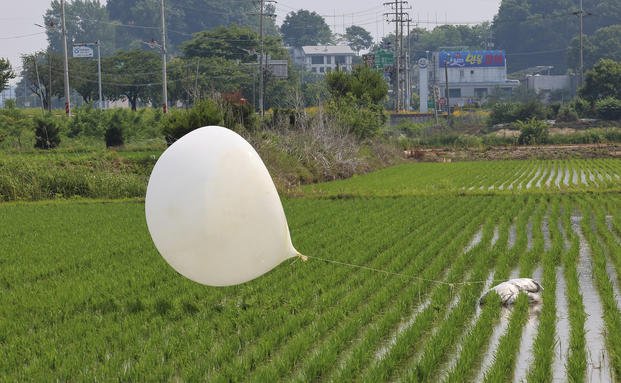

SEOUL, South Korea — North Korea resumed flying balloons likely carrying trash toward South Korea on Thursday, the South’s military said, days after it vowed to respond to what it called new South Korean civilian leafleting activities across the border.
South Korea’s Joint Chiefs of Staff said in a statement that the balloons were flying north of Seoul, which is about an hour’s drive from the border, on Thursday afternoon.
It warned the South Korea public to be cautious of falling objects and report to authorities if they spot balloons on the ground.
Starting in late May, North Korea has floated more than 2,000 balloons carrying wastepaper, scraps of cloth, cigarette butts and even manure toward South Korea, saying they were in response to South Korean activists sending political leaflets to the North via their own balloons. No hazardous materials were found.
In response, South Korea suspended a 2018 tension-reduction deal with North Korea, resuming propaganda broadcasts briefly and front-line live-fire military drills at border areas.
The Cold War-style campaigns between the Koreas had paused after North Korea last sent rubbish-carrying balloons toward South Korea in late June.
Earlier this week, the powerful sister of North Korean leader Kim Jong Un said South Korean balloons have been found again at border and other areas in North Korea. In her statement Tuesday, Kim Yo Jong threatened new retaliatory steps, saying South Korean “scum” must be ready to pay “a gruesome and dear price.” That raised concerns that North Korea could stage physical provocations, rather than balloon launches.
South Korea’s military said Wednesday it has boosted its readiness to brace for any provocation by North Korea. It said North Korea may fire at incoming South Korean balloons across the border.
It wasn’t immediately known whether groups in South Korea have recently scattered leaflets in North Korea. For years, activist groups led by North Korean defectors have used helium-filled balloons to drop anti-North Korean leaflets, USB sticks containing K-pop music and South Korean dramas and U.S. dollar bills in the North.
North Korea views such activities as a serious security threat and challenge to its ban on foreign news for most of its 26 million people.
In 2020, North Korea destroyed an unoccupied South Korean-built liaison office on its territory in a furious response to South Korean civilian leafleting campaigns. In 2014, North Korea fired at balloons flying toward its territory and South Korea returned fire, though there were no casualties.
Tensions between the Koreas have heightened in recent years because of North Korea’s missile tests and the expansion of U.S-South Korean military drills that North Korea calls invasion rehearsals.
© Copyright 2024 Associated Press. All rights reserved. This material may not be published, broadcast, rewritten or redistributed.
